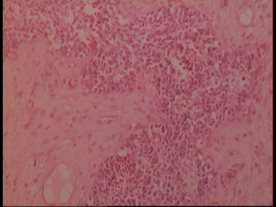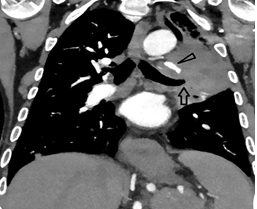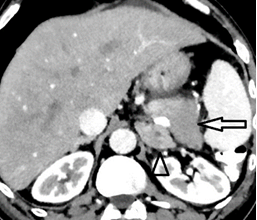Ectopic Adrenocorticotropic Hormone Syndrome in Small Cell Lung Cancer Associated with Refractory Hypokalemia: A Case Report
Koch Elias1, Nakhoul Rola2, Amara Amir3, Evgeny Farber4, Jerdev Michael5, Nakhoul Farid4,7*, Nakhoul Nakhoul6,7
1Department of Dermatology, Universitatsklinikum Erlangen, Germany
2Szejed faculty of Medicine, Szejed, Hungary
3Department of Internal Medicine A, Baruch Padeh Poriya Medical Center, Azrieli, Israel
4Nephrology and Hypertension Division, Baruch Padeh Poriya Medical Center, Azrieli, Israel
5Radiology Department, Baruch Padeh Poriya Medical Center, Azrieli, Israel
6Ophtalmology Division, Baruch Padeh Poriya Medical Center, Azrieli, Israel
7Faculty of Medicine, Bar Ilan University, Ramat Gan, Israel
*Corresponding Author: Dr. Nakhoul Farid, Nephrology and Hypertension Division, Azrieli Faculty of Medicine, Bar Ilan University ramat-gan University, Ramat Gan, Israel
Received: 26 July 2019; Accepted: 14 August 2019; Published: 15 November 2019
Article Information
Citation: Elias K, Rola N, Amir A, Farber E, Michael J, Farid N, Nakhoul N. Ectopic Adrenocorticotropic Hormone Syndrome in Small Cell Lung Cancer Associated with Refractory Hypokalemia: A Case Report. Archives of Clinical and Medical Case Reports 3 (2019): 466-471.
View / Download Pdf Share at FacebookAbstract
Small cell lung cancer (SCLC) is aggressive cancer with high mortality without appropriate early treatmenr. The patient can present with paraneoplastic syndromes, such as Cushing syndrome, because of an inappropriate secretion of ectopic adrenocorticotropic hormone (ACTH) with severe hypokalemic metabolic alkalosis, Parathyroid hormone with hypercalcemia, and hyponatremia due to inappropriate anti-diuretic hormone (ADH) secretion. Patients with SCLC and paraneoplastic syndrome, are with poor prognostic factor. Diagnosis must be made early with immediate treatment. We report a 57-year-old male patient who had severe refractory hypokalemia, metabolic alkalosis, and hypertension as manifestations of an inappropriate secretion of ACTH-secreting from small cell carcinoma of the lung. He was treated with high doses of spironolactone to control the symptomatic refractory hypokalemia, and Metyrapone to control the ectopic ACTH secretion. Aggressive chemotherapy was initiated soon after lung mass biopsy, with SCLC diagnosis.
Keywords
Small Cell Lung Carcinoma; Paraneoplastic Syndromes; Inappropriate ACTH secretion; Parathroid Hormone; Symptomatic Hypokalemic metabolic alkalosis
Small Cell Lung Carcinoma articles, Paraneoplastic Syndromes articles, Inappropriate ACTH secretion articles, Parathroid Hormone articles, Symptomatic Hypokalemic metabolic alkalosis articles
Small Cell Lung Carcinoma articles Small Cell Lung Carcinoma Research articles Small Cell Lung Carcinoma review articles Small Cell Lung Carcinoma PubMed articles Small Cell Lung Carcinoma PubMed Central articles Small Cell Lung Carcinoma 2023 articles Small Cell Lung Carcinoma 2024 articles Small Cell Lung Carcinoma Scopus articles Small Cell Lung Carcinoma impact factor journals Small Cell Lung Carcinoma Scopus journals Small Cell Lung Carcinoma PubMed journals Small Cell Lung Carcinoma medical journals Small Cell Lung Carcinoma free journals Small Cell Lung Carcinoma best journals Small Cell Lung Carcinoma top journals Small Cell Lung Carcinoma free medical journals Small Cell Lung Carcinoma famous journals Small Cell Lung Carcinoma Google Scholar indexed journals Lung Carcinoma articles Lung Carcinoma Research articles Lung Carcinoma review articles Lung Carcinoma PubMed articles Lung Carcinoma PubMed Central articles Lung Carcinoma 2023 articles Lung Carcinoma 2024 articles Lung Carcinoma Scopus articles Lung Carcinoma impact factor journals Lung Carcinoma Scopus journals Lung Carcinoma PubMed journals Lung Carcinoma medical journals Lung Carcinoma free journals Lung Carcinoma best journals Lung Carcinoma top journals Lung Carcinoma free medical journals Lung Carcinoma famous journals Lung Carcinoma Google Scholar indexed journals Paraneoplastic Syndromes articles Paraneoplastic Syndromes Research articles Paraneoplastic Syndromes review articles Paraneoplastic Syndromes PubMed articles Paraneoplastic Syndromes PubMed Central articles Paraneoplastic Syndromes 2023 articles Paraneoplastic Syndromes 2024 articles Paraneoplastic Syndromes Scopus articles Paraneoplastic Syndromes impact factor journals Paraneoplastic Syndromes Scopus journals Paraneoplastic Syndromes PubMed journals Paraneoplastic Syndromes medical journals Paraneoplastic Syndromes free journals Paraneoplastic Syndromes best journals Paraneoplastic Syndromes top journals Paraneoplastic Syndromes free medical journals Paraneoplastic Syndromes famous journals Paraneoplastic Syndromes Google Scholar indexed journals Inappropriate ACTH secretion articles Inappropriate ACTH secretion Research articles Inappropriate ACTH secretion review articles Inappropriate ACTH secretion PubMed articles Inappropriate ACTH secretion PubMed Central articles Inappropriate ACTH secretion 2023 articles Inappropriate ACTH secretion 2024 articles Inappropriate ACTH secretion Scopus articles Inappropriate ACTH secretion impact factor journals Inappropriate ACTH secretion Scopus journals Inappropriate ACTH secretion PubMed journals Inappropriate ACTH secretion medical journals Inappropriate ACTH secretion free journals Inappropriate ACTH secretion best journals Inappropriate ACTH secretion top journals Inappropriate ACTH secretion free medical journals Inappropriate ACTH secretion famous journals Inappropriate ACTH secretion Google Scholar indexed journals Parathroid Hormone articles Parathroid Hormone Research articles Parathroid Hormone review articles Parathroid Hormone PubMed articles Parathroid Hormone PubMed Central articles Parathroid Hormone 2023 articles Parathroid Hormone 2024 articles Parathroid Hormone Scopus articles Parathroid Hormone impact factor journals Parathroid Hormone Scopus journals Parathroid Hormone PubMed journals Parathroid Hormone medical journals Parathroid Hormone free journals Parathroid Hormone best journals Parathroid Hormone top journals Parathroid Hormone free medical journals Parathroid Hormone famous journals Parathroid Hormone Google Scholar indexed journals treatment articles treatment Research articles treatment review articles treatment PubMed articles treatment PubMed Central articles treatment 2023 articles treatment 2024 articles treatment Scopus articles treatment impact factor journals treatment Scopus journals treatment PubMed journals treatment medical journals treatment free journals treatment best journals treatment top journals treatment free medical journals treatment famous journals treatment Google Scholar indexed journals Hormone articles Hormone Research articles Hormone review articles Hormone PubMed articles Hormone PubMed Central articles Hormone 2023 articles Hormone 2024 articles Hormone Scopus articles Hormone impact factor journals Hormone Scopus journals Hormone PubMed journals Hormone medical journals Hormone free journals Hormone best journals Hormone top journals Hormone free medical journals Hormone famous journals Hormone Google Scholar indexed journals Symptomatic Hypokalemic metabolic alkalosis articles Symptomatic Hypokalemic metabolic alkalosis Research articles Symptomatic Hypokalemic metabolic alkalosis review articles Symptomatic Hypokalemic metabolic alkalosis PubMed articles Symptomatic Hypokalemic metabolic alkalosis PubMed Central articles Symptomatic Hypokalemic metabolic alkalosis 2023 articles Symptomatic Hypokalemic metabolic alkalosis 2024 articles Symptomatic Hypokalemic metabolic alkalosis Scopus articles Symptomatic Hypokalemic metabolic alkalosis impact factor journals Symptomatic Hypokalemic metabolic alkalosis Scopus journals Symptomatic Hypokalemic metabolic alkalosis PubMed journals Symptomatic Hypokalemic metabolic alkalosis medical journals Symptomatic Hypokalemic metabolic alkalosis free journals Symptomatic Hypokalemic metabolic alkalosis best journals Symptomatic Hypokalemic metabolic alkalosis top journals Symptomatic Hypokalemic metabolic alkalosis free medical journals Symptomatic Hypokalemic metabolic alkalosis famous journals Symptomatic Hypokalemic metabolic alkalosis Google Scholar indexed journals patient articles patient Research articles patient review articles patient PubMed articles patient PubMed Central articles patient 2023 articles patient 2024 articles patient Scopus articles patient impact factor journals patient Scopus journals patient PubMed journals patient medical journals patient free journals patient best journals patient top journals patient free medical journals patient famous journals patient Google Scholar indexed journals alkalosis articles alkalosis Research articles alkalosis review articles alkalosis PubMed articles alkalosis PubMed Central articles alkalosis 2023 articles alkalosis 2024 articles alkalosis Scopus articles alkalosis impact factor journals alkalosis Scopus journals alkalosis PubMed journals alkalosis medical journals alkalosis free journals alkalosis best journals alkalosis top journals alkalosis free medical journals alkalosis famous journals alkalosis Google Scholar indexed journals
Article Details
Abbreviations:
SCLC - Small cell lung cancer; ACTH - Adrenocorticotropic hormone; ADH - Anti-diuretic hormone; PTH - Parathyroid Hormone
1. Introduction
Small cell lung cancer (SCLC) expresses various enocrine syndromes such as hypercalcemia due to ectopic PTH secretion and hyponatremia due to ADH excess. The inappropriate secretion of ACTH hormone with Cushing syndrome [1-3] in patients with SCLC, generally present with electrolyte disturbances such refractory symptomatic hypokalemic metabolic alkalosis with arterial hypertension [4, 5]. 15% of cases with ectopic ACTH secretion arise from the tumor or its metastasis [1]. The patients present with cushingoid features with refractory hypokalemic metabolic alkalosis and arterial hypertension. Electrolyte disturbances rarely can be the initial presentation of the cancer. The treatment includes ketoconazole to control the ectopic ACTH secretion and spironolactone in high doses with intravenous potassium, to control the symptomatic hypoklemia. More, aggressive chemotherapy is recommended early to block the spread of the tumor, and the appearance of cuching syndrome.
Here we report a case of SCLC in a 57-year-old male presenting with severe refractory symptomatic hypokalemic metabolic alkalosis, and arterial hypertension as initial presentation.
2. Description of Case
A 57 year old man was admitted to the internal medicine department at our Center in North Israel, because of low back pain, dizziness and motor weakness in his left leg, and general weakness started 20 days before his admission.
Past anamnesis was without any illness, but he had a history of heavy smoking. One month before his last admission, he was admitted in the Orthopedic division due to low back and right leg pain, and was treated with non-steroidal inflammatory drugs such as Ibuprufen, Arcoxia). X-Ray of the right leg showing pathological fracture of the right femure, but surgical intervention for fracture fixation was postponed because of his general condition, and was discharged with symptomatic treatment and follow up.
One week before his last admission, recent peripheral edema developed with general weakness and was referred to our hospital because of severe hypokalemic metabolic alkalosis and high blood pressure, and was readmitted for further evaluation. On physical examination the patient was cachectic and dyspneic, blood Pressure 170/90 mmHg, regular heart rate of 76 /minute, temperature of 36°C, venous jugular congestion with crepitation at the basal lungs with decreased breathing. Abdominal distension with ascites and severe peripheral edema.
Laboratory findings were as follows: white blood cell count, 8000 K/uL, Hemoglobin 16.4 gr%, Platelet count, 170 K/ uL, Glucose level, 140 mg/dL; Sodium 141 mEq/L; Potassium 1.7 mEq/L; Chloride 88 mEq/L; lactic dehydrogenase 863 U/L; and C-reactive peptide 2.8 mg/L (N<1). Arterial blood gas analysis was pH 7.5, pCO2 36 mmol/l, HCO3 40 mmol/L, and oxygen saturation was 98.8% suggesting metabolic alkalosis. Albumin=3.5 gr/dl, blood urea nitrogen (BUN)=15mg/dl, Plasma Creatinine= 0.76 mg/dl Phosphor=2 mg/dl, with elevated liver enzymes (GGT=96 U/L (N=12-64) LDH=526 U/L (N=0-480). The serum ACTH level was elevated to 100 pg/mL (normal value is less than 47 pg/mL) and the 24-hour urine free cortisol level of 19,531 (normal value <100 ?g), Aldosterone= 83 pmol/L, Renin=1 uIU/ml, Lactate=2.3 mmol/L, Potassium= 2.5 mmol/L Urine potassium= 33.5 mmol/L, TSH=0.9 mIU/L (Figure 1).

Figure 1: (A) Microscopic images of small cell lung cancer with Chromogranin positive neoplastic cells, suggestive of small cell lung cancer (H&E stain, ×200).
The chest contrast computed tomography (CT) scan revealed about 7 × 5-cm-mass of the left lung, compressing the pulmonary artery and obliterated the upper lobe bronchus causes the lobe athelectasis (Figure 2), and Bilateral pleural effusion, mediastinal lymphoadenopathy and severe ascites also present. On Abdominal CT, a hypovascular mass of 2.4 × 5.0 cm in the pancreas tail a mass of 4 × 5 cm in left adrenal gland with central hypodense area (Figure 3) suspected for metastases.
Our primary diagnosis was excess ACTH secretion with high plasma cortisol level with activation of the renin-angiotensin aldosterone axis, And consequently hyperaldosteronism according to the laboratory findings of refractory symptomatic hypokalemia metabolic alkalosis and arterial hypertension. Lung mass biopsy was perforformed with bronchoscopy, confirming the diagnosis of small cell lung carcinoma, but ACTH biopsy staining was not performed. The physiological pathway involved in the pathogenesis of hypokalemia is the mineralocorticoid effects of the cortisol excess from ectopic ACTH secretion. The normal pathway for cortisol conversion of cortisone is by the action of 11 beta-hydroxysteroid dehydrogenase for the physiological effect of cortisol under normal conditions. In our case, the high concentration of blood cortosol, there is a potent mineralocorticoid effect with severe hypokalemic metabolic alkalosis. To reduce the high cortisol level before chemotherapy, Metyparone was administered. Hypokalemia was normalized by high doses of Spironolactone and oral Potassium compound (Slow-K). Once potassium levels and the ectopic ACTH production were controlled, the patient was transferred to the oncology division for systemic chemotherapy.

Figure 2: Chest computed tomography (CT) scan revealed about 7 × 5-cm-sized mass in left upper lobe showing compressing of the pulmonary artery with pleural effusion and mediastinal lymphoadenopathy.

Figure 3: Abdominal computed tomography (CT) scans (Adrenal Protocol) showed edema of the pancreas with severe ascites, and a mass of 4 × 5 cm in left adrenal gland with central hypodense area suspected for adrenal gland metastases.
3. Discussion
Cushing syndrome due to ectopic ACTH secretion was described in 15% of all cases of Cushing syndrome. SCLC and bronchial carcinoids account for about 50% of the cases [6-8]. The patients generally present with hyponatremia or hypercalcemia [8]. Few cases in the literature described symptomatic refractory hypokalemic as an initial presentation of small cell lung cancer. As in our case, the patient present with severe refractory hypokalemic metabolic alkalosis and arterial hypertension. Hypokalemia refractory to large intravenous potassium supplements can be one of the features of ectopic ACTH secretion with hypercortisolism. These patients usually present with high ACTH levels (>20 ng/L) and hypercortisolism which is not suppressed with high doses of dexamethasone (8 mg/day). High cortisol blood levels activate the mineralocorticoid axis with increased urinary secretion of potassium resulting in hypokalemia and metabolic alkalosis.
The treatment of choic in these conditions of ectopic ACTH secretion from lung cancer is immediate medical treatments by the glucocorticoid synthesis inhibitors such as ketoconazole or metyrapone [8]. Ketoconazole blocks corticosteroid production by inhibiting 17-hydroxylase and 11-hydroxylase, is the therapy of choice because of its low incidence of side effects. To control the refractory hypokalemia, large intravenous and oral potassium replacement and spironolactone are indicated [9, 10].
4. Conclusion
Patient with refractory hypokalemia with metabolic alkalosis and arterial hypertension with normal renin-aldosterone levels, should be suspected for ectopic ACTH secretion from malignancy especially SCLC.
5. Disclosure
No human or animal experiments were conducted.
Conflicts of Interest
The authors declare that there are no conflicts of interest regarding the publication of this case report.
References
- Mayer S, Cypess AM, Kocher ON, et al. Uncommon presentations of some common malignancies: Case Sequential paraneoplastic endocrine syndromes in small-cell lung cancer. J Clin Oncol 23 (2005): 1312-1314.
- Yang H, Sung HJ, Kim JE, et al. A case of ectopic ACTH syndrome associated with small cell lung cancer presented with hypokalemia. J Korean Endocr Soc 22 (2007): 359-364.
- Jeong C, Lee J, Ryu S, et al. A Case of Ectopic Adrenocorticotropic Hormone Syndrome in Small Cell Lung Cancer. A case report. Tuberc Respir Dis 78 (2015): 436-439.
- Izzedine H, Besse B, Lazareth A, et l. Hypokalemia, metabolic alkalosis, and hypertension in a lung cancer patient. Kidney Int 76 (2009): 115-120.
- Mandaliya R, Hughes L, Auerbach H, et al. Small Cell Lung Cancer Presenting as Severe Thrombocytopenia and Refractory Hypokalemia. Case Report. Case Reports in Oncological Medicine (2014): ID 874831.
- Jeong C, Jinhee Lee J, Ryu S, et al. A Case of Ectopic Adrenocorticotropic Hormone Syndrome in Small Cell Lung Cancer. Tuberc Respir Dis (Seoul) 78 (2015): 436-439.
- Natarajana A, Abugrouna A, Khana A, et al. The First Report of Small Cell Cancer of the Uvula Presenting With Ectopic Adrenocorticotropic Hormone Syndrome: case report. World J Oncol 9 (2015): 115-118.
- Elston M S, Crawford VB, Swarbrick M, et al. Severe Cushing’s syndrome due to small cell prostate carcinoma: a case and review of literature. Endocrine Connections 6 (2017): R80-R86.
- Schwetz V, Aberer F, Stiegler C, et al. Fluconazole and acetazolamide in the treatment of ectopic Cushing’s syndrome with severe metabolic alkalosis. Endocrinology, Diabetes & Metabolism: case report (2015).
- Ferreira TL , da Silva NT, Canário D, et al. Hypertension and severe hypokalaemia associated with ectopic ACTH production. MJ Case Rep (2018).


 Impact Factor: * 5.31
Impact Factor: * 5.31 Acceptance Rate: 75.63%
Acceptance Rate: 75.63%  Time to first decision: 10.4 days
Time to first decision: 10.4 days  Time from article received to acceptance: 2-3 weeks
Time from article received to acceptance: 2-3 weeks 
